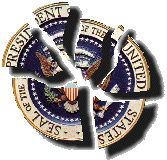PRGNet
 Presidential Power Presidency
Presidential Power Presidency
Forging the Presidency for the 21st Century
There can be no question that Presidential Power has had a tremendous influence on scholarship dealing with the presidency. Our goal, however, is not to reflect on the past, but rather to look to the future. There are a number of major questions that have been raised but not resolved by Neustadt's work. Our objective is to focus on these questions in two days of intensive discussion.
Panel Descriptions
- The Personalization of Power.
- One of Neustadt's greatest contributions was expanding the vision of presidential scholars to include the dynamics of personal leadership. He views power more as a function of personal politics than of formal authority or position. Yet many authors have argued that attention on both the academy and the press is focused inordinately on the President's's personal traits at the expense of the institutional environment in which he functions. What is the principal source of power? What is the appropriate balance between personality and position?
- Organizing the Presidency.
- One of Neustadt's richest legacies is in his discussion of presidential decision-making. Yet it is not clear what we (and presidents) have learned. The President regularly concludes that he must reorganize his staff and decision-making processes. Institutional memory in the White House is fleeting. How can the President most effectively structure his office to accomplish his goals? How is the President's ability to organize his advisory system constrained by the institutional features of the presidency? And, considering that presidential advisory networks extend beyond the White House staff, how are other relevant advisors (political consultants as well as Cabinet members) integrated into the larger advisory system?
- Presidents as Persuaders.
- Neustadt's most famous dictum is that presidential power is the power to persuade. He depicts the President operating in a pluralistic environment in which there are numerous actors with independent power bases and perspectives different from his. Thus, the President must marshal resources to persuade others to do as he wishes. A President cannot rely on expanding the institution's legal authority or adjusting its support mechanisms. Yet many scholars have emphasized the limitations of the President's persuasive potential and others continue to stress the importance of institutional bases of command. What is the potential of persuasion? Have we gone too far in deemphasizing the legal and institutional bases of power?
- The President in the Political System.
- Presidential Power adopts a presidency-centered orientation to American government, viewing it from the perspective of the President. Many academics and journalists implicitly adopt the same orientation. Yet some authors conclude that the President is not and should not be the center of American government. They feel that Neustadt's approach neglects the question of examining the presidency from the perspective of the American political system and carries the implicit assumption that the President should be the principal decision-maker in American politics. What is the proper role of the President in American government, and what are appropriate expectations of the presidency? In addition, should an evaluation of the goals and means of presidents be part of analyses of power?
- The Potential for Leadership.
- The late twentieth century has witnessed a series of presidencies that have been criticized for lacking vision and inspiration. Ultimately, what is the potential of presidential leadership? Can presidents move beyond facilitating transactions among policymakers and transform the public's thinking and the institutional setting in Washington? If they can engage in transformational leadership, should we expect them to do so?
Connect to:
Contact us at PRGNet.
